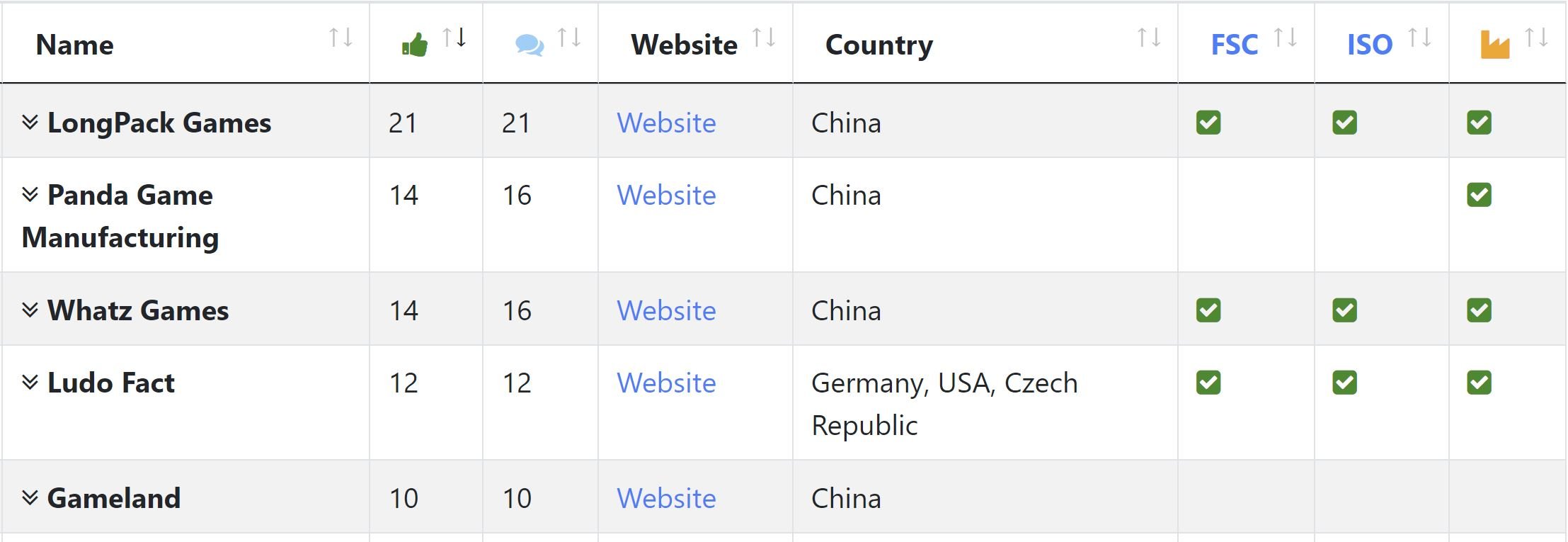Nuts & Bolts - How to Find a Manufacturer
[Read our full Nuts & Bolts series]
Manufacturing abroad can be a scary and confusing proposition. There’s often a language barrier, it is a large capital investment, and it can be difficult to know who has a strong reputation.
In this quick guide, I’ll lay out everything you need to know to find a manufacturer at a competitive rate, with high standards and surety of execution.
[Note: This article is for finding a manufacturer for a full print run 1,000+ games. For print on demand, or small print runs, you’ll use other services.]
Where to Find Board Game Manufacturers
There are three ways to find potential manufacturing partners.
Word of Mouth
Word of mouth is the least methodical, but if you’re hanging out in board game forums you should start to get a decent idea of who publishers use for manufacture. For instance, we’re using Meijia for our first print run of Nut Hunt, and Jamey over at Stonemaier is fairly vocal about his good experiences with Panda GM.
Early in our publishing Journey I stumbled upon this list of board game manufacturers. It’s fairly comprehensive and is an excellent place to start your search for a manufacturer.
ImportYeti scrapes bills of landing and compiles a database of the importer and exporters of name on shipments. You can search for any company and find who exported their product – i.e. who they used for manufacture.
This is a great tool not only for finding manufacturers, but also to check their reputation.
[Note: ImportYeti shows named importers & exporters to the US, so it will not show domestic manufacturers. There are a number of US based printers who can do packaging and cardstock, but there are no large scale US based full skew manufacturers.]
RFQ ~10 Manufacturers
Once you have a list of potential manufacturers, it’s time to Request for Quote (RFQ) them. This is where you reach out to them with the specifications of your game, and find out how much it will cost to produce.
Especially if you are a new publisher, I would recommend RFQing at least 10 manufacturers.
This should give you a good idea of the range of prices, communication, and service. Some manufacturers might set up a call to talk about your project, others might send you a sample kit, some will be prompt, and others a bit slower with communication.
This article isn’t meant to be a guide to RFQing, for that I would check out these resources.
The Art of the RFQ (James Manthe - Archived)
It is important to be consistent with your RFQs, to query for a number of unit volumes, and to make sure they include Freight on Board (FOB) to a local port. And make sure to spot check freight costs from each port.
Once you have your RFQs in hand, narrow down the search to a short list of 2-3 manufacturers and start digging into reputation.
Do Your Due Diligence
While it’s important to find cost effective manufacture, more important is the reputation and surety of quality of manufacture. 10% higher price might cost you a few grand on that first print run, but a low quality first print run might put your budding company out of business.
So, do your homework.
Check ImportYeti to see who they’ve manufactured for
Ask for reference checks in board game publishing forums
Always keep in mind the timeframe of when people have worked with a factory, their experience, and their order quantity. Businesses can change over time – there are definitely a couple of manufacturers who used to have QA issues, but have since tightened up their production lines and are well vouched for.
Random Thoughts
It’s important to keep in mind, that when you hire a manufacturer you are not only bringing them on for their in house capabilities, but they are also a project manager and will be sourcing components from other nearby operations. This is due to industrial clustering, which I wrote about here: Industrial Clusters & Board Game Manufacturing.
Once you start publicly talking about manufacture (asking for reference checks, etc), factory reps will start reaching out to you. Some of these reps will be from smaller or newer factories. They might offer competitive pricing. They might have impeccable QA and great communication.
But, the less established a manufacturer is – the less due diligence you can do – the higher the risk you are taking on in partnering with them. It’s unfortunate, because factories need clients to build up a reputation. But for us, the risk of working with unknown partners is too great to make up for any potential savings.
I’ll leave scouting new manufacturing up to more established companies who can have their own reps on the ground doing due diligence. For the foreseeable future we only expect to work with established manufacturers, with an impressive client bases, and substantive experience.
Who did you use to manufacture your game, how did you find them, and what was your experience with them?





